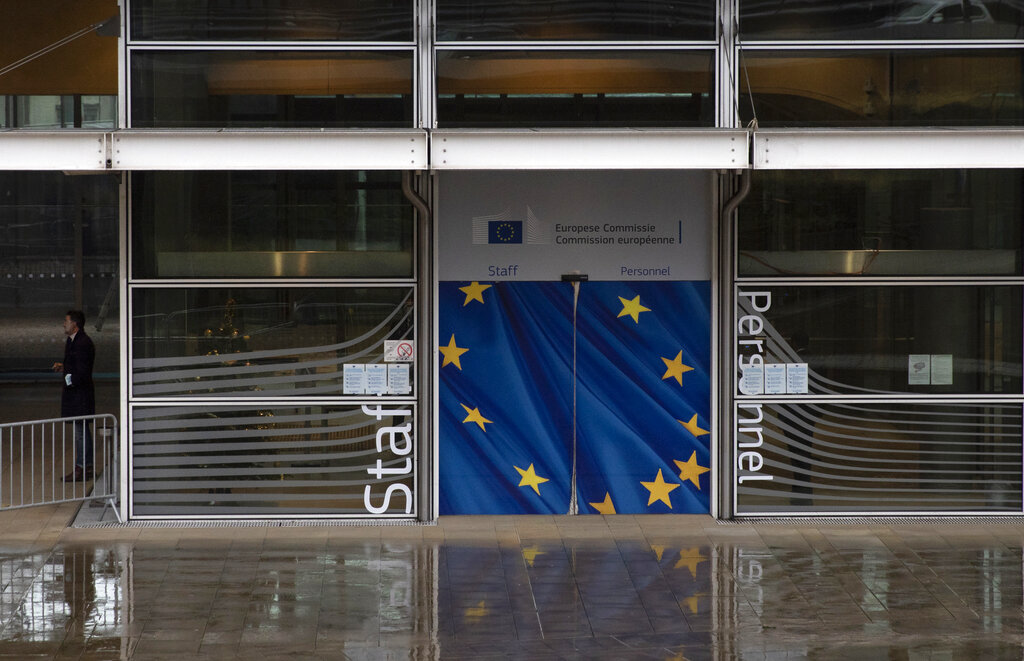
A man takes a break outside of EU headquarters in Brussels, Wednesday, Dec. 23, 2020. (Photo: AP)
European Union and British negotiators closed in on a trade deal Wednesday, raising hopes a chaotic economic break between the two sides on New Year's Day could be averted, officials said.
After resolving a few remaining fair-competition issues, negotiators dealt last with EU fishing rights in U.K. waters as they worked to secure a deal for a post-Brexit relationship after nine months of talks.
Sources on both sides said the negotiations were in a final phase, with one EU official saying: “I expect to see some white smoke tonight." The official asked not to be identified because the talks were still ongoing. The British government said an agreement might come as soon as Wednesday night, but it was not guaranteed.
Customs checks and some other barriers will be imposed under whatever circumstances on Jan. 1, but a trade deal would avert the imposition of tariffs and duties that could cost both sides billions in trade and hundreds of thousands of jobs. Britain withdrew from the EU on Jan. 31, and an economic transition period expires on Dec. 31.
British Prime Minister Boris Johnson has always insisted the U.K. would “prosper mightily” even if no deal were reached and the U.K. had to trade with the EU on World Trade Organization terms.
But his government has acknowledged that a chaotic exit is likely to bring gridlock at Britain’s ports, temporary shortages of some goods and price increases for staple foods. Tariffs will be applied to many U.K. exports, including 10% on cars and more than 40% on lamb, battering the U.K. economy as it struggles to rebound from the impact of the coronavirus pandemic.
Rumors of a pre-Christmas trade deal surfaced in recent days based on progress on the outstanding issues beyond fishing. However, some EU nations insisted that upon close scrutiny, Britain's latest proposals on quotas for EU vessels in U.K. waters were far less conciliatory than first met the eye.
On Wednesday, the brokering on quotas and transition times for EU vessels to continue fishing in U.K. waters were in full swing, with progress reported from several sides.
In London, U.K. Cabinet minister Robert Jenrick said, “We will need to get those final issues resolved, and there’s some way further to go on that.” He said he nonetheless felt optimistic.
The EU has long feared that Britain would undercut the bloc's social, environmental and state aid rules to be able to gain an unfair edge with its exports to the EU. Britain has said that having to meet EU rules would undercut its sovereignty. On those issues, a compromise had been reached, a diplomat from an EU country said.
If both sides fail to meet the Jan. 1 deadline, it’s unclear under what conditions trade would take place before a deal would eventually be approved.
Over the past few days, Johnson and EU Commission President Ursula von der Leyen have been drawn more and more into the talks and have been in contact by phone seeking to unblock negotiations.
Businesses on both sides are clamoring for a deal that would save tens of billions in costs. A failure to reach a post-Brexit deal would lead to more chaos on Britain’s borders with the EU at the start of 2021, when new tariffs by both sides would add to other impediments to trade.
The border is already reeling from new restrictions placed on travelers from Britain into France and other EU countries due to a new coronavirus variant sweeping through London and southern England. One U.K. minister said Wednesday that some 4,000 trucks were stuck in traffic jams near Dover, waiting for their drivers to get virus tests so they can enter the Eurotunnel to France.
While both sides would suffer economically from a failure to secure a trade deal, most economists think Britain would take a greater hit, at least in the near-term, as it’s relatively more reliant on trade with the EU than the other way around.


